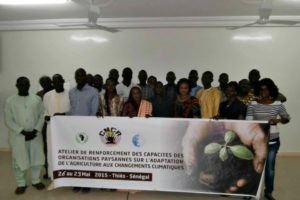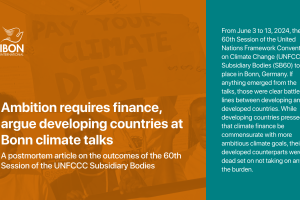by Jax Bongon
From February 20 to 23, 2024 member states of the United Nations Economic and Social Commission for Asia and the Pacific (UN ESCAP), international organisations, civil society, and other stakeholders convened for the annual Asia Pacific Forum on Sustainable Development (APFSD) to assess the region’s progress towards achieving the 2030 Agenda for Sustainable Development Goals (SDGs). In its 2024 SDG Progress Report launched at the forum, the UN ESCAP stated that the region was regressing in terms of achieving SDG 13 (climate action), characterising the Asia Pacific as “both a victim and a major driver of climate change.”
Asia Pacific civil society however maintained that ambitious climate action was contingent on the delivery of new, additional, and adequate public climate finance and capacity-building by developed countries to poor and underdeveloped countries in the region. Meeting climate mitigation and adaptation needs in Asia Pacific requires at least USD 1.1 trillion per year. From 2013 to 2020, however, only USD 113 billion, or about USD 14 billion per year, in climate finance reached recipient countries in Asia, woefully inadequate to cover even the lower end of their climate goals.
Data also reveals that climate finance delivered in the region was overwhelmingly in the form of loans and other non-grant instruments. Bilateral providers committed only 18% of their climate finance to the region through grants (USD 1.2 billion per year on average); the remaining 82% were through loans and other debt instruments (USD 5.4 billion per year on average).
Movements and civil society also strongly countered the emerging narrative that pins the blame on the climate crisis on developing countries in the region for their increasing absolute emissions. This overlooks the fact that global North countries, historically, have used much of the world’s carbon space and exploited its natural resources in their relentless pursuit of growth, to the detriment of the peoples of the global South’s right to development. Per capita emissions analysis shows that while Asia Pacific is responsible for 30.99% of global cumulative emissions, it is home to more than half of the world’s population. Meanwhile, North America contributed 28.35% of global cumulative emissions – the main determinant of dangerous climate change – despite only accounting for 4.68% of the world’s population.
Civil society positions also underscored the importance of democratising development processes, including climate policymaking and governance. At the SDG 13 roundtable panel, Ivan Enrile, IBON International Programme Manager, highlighted the importance of people’s participation in raising climate ambitions and decried the shrinking civic spaces in the region. Enrile said: “Climate governance must shift away from being party-driven to being a people-driven process so that the most vulnerable communities have a seat at the decision-making table.”
At the closing plenary, where the Chair’s Summary was deliberated, developed countries proposed amendments to weaken the purpose of the document and the APFSD itself. Originally phrased as the region’s “input” to global dialogues on sustainable development, including the 2024 High-level Political Forum and the Summit of the Future, the language in the Summary was replaced with “inform”, diminishing its significance in decision-making.
Although the Summary incorporated some input from civil society, it remains a confluence of viewpoints from various actors and interests. The document even included a position to scale up climate finance instruments through debt swaps and green and blue bonds, which corporate lobbyists typically promote despite climate justice groups’ concerns for adding to the debt burden of developing countries. Issuing of bonds by developing countries also implies that they will be bearing the costs of mitigation and adaptation, with interest, instead of the developed countries that have contributed the most to the climate crisis.
Ultimately, the Chair’s Summary is an embodiment of the problem with the present multilateral system—privileging corporations as development actors and allowing them to co-opt development processes. There is already growing scepticism within civil society regarding the Summit of the Future, which the UN Secretary-General envisions as a boost towards achieving the SDGs through a ‘Pact for the Future.’ The Pact’s zero draft underscores “inclusive” multilateralism, which, in practice, means including even corporations in the process despite historically derailing climate action and depriving peoples in the Asia Pacific of sovereignty over development.
For civil society, mere reforms would not suffice. A radical overhaul is needed that will strike at the current neoliberal framework of development—the root cause of inequality, injustice, and climate change.
Preceding the APFSD, the Asia Pacific Regional CSO Engagement Mechanism hosted the annual Peoples’ Forum, offering an alternative platform for different constituencies to articulate their demands. A collective statement outlining peoples’ aspirations for development justice was presented to the APFSD through plenary discussions, dialogues, and roundtables.

![[EVENT] Civil Society Caucus for Climate Justice](https://iboninternational.org/wp-content/uploads/2022/11/CSO-CAUCUS-CJ-300x200.jpg)


